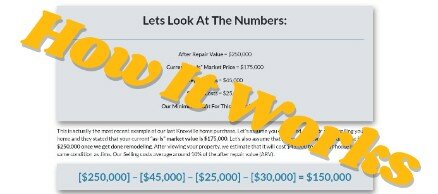Many times, We buy houses In Knoxville TN to help many fellow Knoxville residents avoid losing their homes to the bank. The idea of owning a house is held dear by many Americans, especially here in Knoxville where the pride of home ownership is seen as an accomplishment. Saving a lot of money and keeping to a strict budget is essential, as is having a good credit score.
A person’s dream might transform into a living nightmare for a variety of reasons. For example, you may get laid off, interest rates could skyrocket or the economy could flip, and you’ll have to take on additional debt as a result. To keep yourself in control, how do you keep yourself in check?

Short Sale Vs. Foreclosure – A Comparison
If you fall behind on your mortgage payments, or if your property is underwater, you generally have two options at your disposal if the home is worth much less than is owed: short sale or foreclosure. For several reasons, a homeowner may choose a short sale over a bankruptcy. In all circumstances, the owner is obliged to sell the property, but the timetable and other implications vary.
 Short Sale
Short Sale
In short, a short sale is a voluntary procedure in which the homeowner sells the property for less than the amount outstanding on the mortgage. To expand, a short sale is defined as where a property owner cannot afford to repay the debts secured by liens against the property, and the lien holders agree to release their claim and take less than what is owed on the loan in exchange for releasing their lien on the property.
Borrowers and lenders can come to an agreement on a short sale in rare situations. A short sale occurs when a house is offered for sale at a price below what is owed on the mortgage. In some cases, the borrower may still owe the outstanding sum, which is known as the deficit.
In this case, it may take some time because the mortgage is held by several separate lending institutions. If even one of the parties involved in the transaction does not agree to the conditions of the sale, the agreement might break apart.
There is no choice in the matter of a foreclosure. After the borrower defaults on a loan, the lender may lawfully confiscate the property. This is the lender’s final resort, since the house serves as security for the loan.
Should I Sell my Home this way?
There are some items to address that you should know before you consider selling your home via short sale.
A short sale can be a smart way to mitigate foreclosure on a mortgage, although they can be difficult to attain in today’s market, they often prove to be a simpler way to resolve any debt left over from a loan. When the wave of foreclosures reached Knoxville during the last recession, short sales were all the rage… However, lenders are less likely to offer a short sale as an option than they used to be, as foreclosures have decreased and house prices have increased.
There is one major advantage to a short sale: You can prevent foreclosure on your property. As a result of your mortgage lender accepting less than the full amount owing, you are no longer responsible for the outstanding debt.
The inability to secure a new home loan due to a foreclosure appearing on your credit report for up to seven years is only the beginning of the troubles that might arise when your house goes into foreclosure.
When your credit score is down, even renting will be more difficult, as you must typically reveal your foreclosure history when applying for a rental. It might take years to get a new mortgage after a foreclosed property has been on the market for a lengthy period of time.
Credit Score
If you short sell your home, you won’t be able to predict precisely how much your credit score would suffer because there are so many elements that go into it. Your credit score is likely to drop after a short sale if you’ve never missed a payment on your credit card, mortgage or auto payment, but not as much as it would if you had.
In addition, the severity of the hit to your credit score will depend on how the bank reports the short sale to the credit bureaus. As a result, understanding the lender’s conditions Prior agreeing to the terms of your mortgage loan and reporting it to the credit bureaus is critical. In the event that your mortgage is reported as “settled for less than full balance” by your lender, your credit score will suffer less.
Tax implications
When you short sell your home, you are essentially erasing your debt by the difference between the sale price and your mortgage balance. This forgiven debt is treated as income by the IRS, and as a result, you are usually subject to taxation on it. A few exceptions exist.
Your tax expert should always be consulted prior to making any tax-related choices.
Will I be able to buy another home?
An FHA loan can’t be obtained if your mortgage or other installment payments (such as auto and student loan installments) were more than 30 days past due within the 12 months before the short sale date. The year before applying for a mortgage, you must not have been 30 days behind on your mortgage or installment payments.
Each mortgage investor has their own set of guidelines. Even if you’re current on all of your payments, you can’t acquire a conventional loan to purchase another property until at least four years.
 Foreclosure
Foreclosure
Foreclosures are started solely by lenders, unlike short sales. The lenders of mortgagors who are three to six months behind on their payments may proceed with foreclosure unless the debtors bring their debts current. Keep in mind, you do have options if you are facing foreclosure.
Different states have different requirements for lenders and homeowners when it comes to foreclosure notices and the alternatives they have when trying to catch up on their mortgage payments. A bank is also required by law to sell the property within a certain time frame.
First, the lender starts legal proceedings to seize ownership of the property in order to compel the sale of the residence. As a result, the lender proceeds against late borrowers in an effort to recover its investment in the mortgage. In contrast to short sales, many foreclosures occur after the homeowner has left the property and is no longer able to pay the mortgage. The lender evicts the residents in the foreclosure process if they haven’t already done so.
Once the lender gets access to the property, it requests an independent assessment and continues with the sale of the property. Due to the lender’s desire to liquidate the asset as fast as possible, foreclosures often take less time to complete than a short sale. These residences may also be sold in trustee sales, when purchasers compete for the property with others at a public auction.
Foreclosure may have a significant impact on your credit score. Getting a bank loan to buy a car and rent a property may not be achievable.
For up to seven years following a foreclosure, obtaining a mortgage will be near impossible. Short sales offer a little more flexibility for the seller, allowing new home applications only 2 years after the filing depending on the bank. It also makes a mortgage lender more likely to approve your loan than if you had a full foreclosure, getting you back into a home faster.
How To Get Started With A Short Sale
For a short sale to be started, it has to be approved by the mortgage holder’s bank first. A short sale must also be supported by documents from the lender—typically a bank—as to why it’s in everyone’s best interest. As a result of this, the lending institution might wind up losing a lot of money.
One potential benefit of the short sale is there are usually no fees associated with the process from the bank. The banks just want to get the note off of their books and if it can be proven that your house is underwater, if you owe more than your house is worth, and you’re at the risk of walking away from the house, the bank may rather work out a short sale instead of going through a costly foreclosure.
When a short sale is authorized, the buyer first negotiates with the homeowner before going to the bank for a loan. A short sale cannot take place without the consent of the lender, which should be stressed enough. Short sale revenues go to the lender after the transaction is authorized and completed. It is still up to the homeowner to pay the deficiency—the balance of the loan.
What To Keep In Mind
here are implications to short sales and foreclosures for homeowners. Both necessitate that homeowners give up their homes, even if they may not be ready to do so, well before they are ready. However, the parallels cease here.
Short sales may take up to a year to complete because of the amount of paperwork involved. Foreclosures, on the other hand, are usually completed in a matter of days. As previously stated, banks often want to collect as much money as possible from the sale of a property as rapidly as feasible.
Foreclosures, on the other hand, have a negative impact on a homeowner’s credit rating. Short-sale homeowners may be able to buy a new house right away if they meet certain requirements. Although a person’s credit record may be affected for seven years after a foreclosure occurs, this is not the case. After a foreclosure, most homeowners have to wait at least five years before they can buy a new property in many cases.
Avoid Foreclosure And Sell Your House Fast
If you are sick and tired of struggling to pay your mortgage on your property, sell your house fast! Skip the long process of dealing with agents, tire kickers, and all the people who will waste your time. We are legitimate cash home buyers in Knoxville TN. Wasting your time is not part of our process. Our time is valuable just like yours! If you want to sell your house for cash, check out our additional pages below to learn more about us and our process, or simply fill out the form to get started today!
Suggested Pages We Encourage You To Visit!



